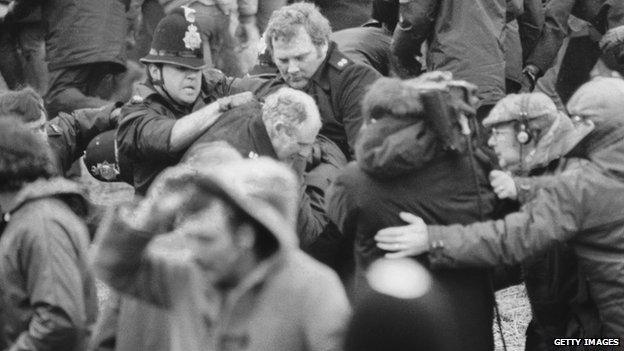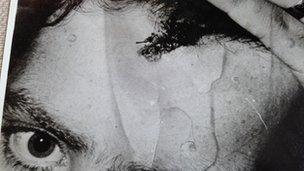Miners' strike: 'Police fitted me up'
- Published

More than 90 people were arrested and both miners and police officers were injured at Orgreave
Thirty years on from the miners' strike there are growing calls for a public inquiry into allegations of widespread miscarriages of justice - with claims that many picketers were arrested on bogus charges and evidence was falsified to get them to court.
The Home Office has so far refused to comment on the inquiry demands. Cabinet papers relating to the 1984-5 miners' strike are due to be published on Friday.
"I remember hearing the sound of glass smashing and then within seconds there was just a stampede. People were falling over themselves trying to get out of the way. It was every man for himself."
Miner Ray Riley had been picketing at Frickley Colliery in West Yorkshire in November 1984 when trouble broke out.

Mr Riley had a head wound after being arrested and assaulted
Fleeing a police charge, he had taken refuge in a nearby garden when he was arrested and assaulted by a group of police officers.
He needed stitches to a head wound and was taken straight from hospital to a police cell and charged with breach of the peace. The police said he threw a missile before he ran and struggled violently on arrest - both claims he strenuously denies.
"I'm saying absolutely and emphatically that the police fitted me up. If convicted I would have been instantly dismissed from British Coal. A lot depended on it, they were quite serious odds and I took it upon myself to do a bit of my own detective work," he said.
Mr Riley went back to the estate where events took place and found two residents who contradicted the police version of his arrest, backed up his account and threw doubt on that of the officers.
A jury cleared him of the charge and he went on to win compensation from West Yorkshire Police.
But more than 11,000 people were arrested during the strike and more than 8,000 were charged - mostly with breach of the peace and obstruction.
Pat Gore, the solicitor who represented Mr Riley, said his acquittal was against the odds.
"It was very difficult if you were in court and the evidence was that of the police and that of you, as a miner. The benefit of the doubt was generally given to the police and therefore I think a lot of people felt quite aggrieved at the outcome of those court hearings," she said.
A spokesman for West Yorkshire Police said: "While many issues relating to the incident have already been dealt with through the courts, if there are any outstanding matters which Mr Riley feels are still unresolved, we believe that it is vital and in the public interest that these are addressed."
Vera Baird QC served as Solicitor General in the last Labour government, and is now Police and Crime Commissioner for Northumbria.
But in 1984 she represented some of the 93 men arrested after clashes at Orgreave, coking works near Rotherham, South Yorkshire. Some were charged with riot or unlawful assembly and could have faced considerable prison terms if convicted.
During the first trial of 15 picketers she was able to dismantle the police evidence by proving to the court that two officers had lied under oath about an incident they could not possibly have witnessed. She demonstrated they had also lied over a forged signature on one of the officer's statements.
Other barristers went on to produce evidence which also undermined police witnesses and the prosecution gave up the case. All 93 men were acquitted.
Ms Baird said: "The Orgreave trial had at its core what I can't describe in any other way than a plot to pervert the course of justice."
Hillsborough 'parallels'
No officers were prosecuted or disciplined as a result of the Orgreave trial, but South Yorkshire Police has now referred itself to the Independent Police Complaints Commission after allegations about manipulated statements were made last year in a BBC Inside Out documentary.
The IPCC has spent the last year carrying out a "scoping exercise" - working out if it has the necessary powers and resources to look at what happened at Orgreave, but has yet to decide if it will investigate.
South Yorkshire Police is currently under investigation over claims of falsified statements following the Hillsborough football disaster in 1989, and campaigners on behalf of the miners arrested believe there are parallels with events at Orgreave.
Barbara Jackson of the Orgreave Truth and Justice Campaign is demanding an immediate inquiry: "We think because the police had already got away with what happened at Orgreave - nobody was held to account, no officer, no force - the police were then emboldened to take the same view that they could mislead and fabricate things at Hillsborough as well."
Michael Mansfield QC, who has direct involvement with both campaigns, agrees and believes the miners, like the Hillsborough families, deserve to find out what happened.
"What matters most to them is the fact that there was no accountability for officers who had plainly broken the law and it seems to me that this still needs to be rectified in the same way as Hillsborough. It doesn't matter when it happened, you have to investigate it because otherwise it gives them immunity," he says.
Blacklisted
South Yorkshire Police refused to comment while the IPCC is considering the evidence.
While some people were cleared, thousands were convicted during the year-long strike, leaving them with damaging criminal records.
Alex Bennett was arrested at the Bilston Glen pit in Scotland and still maintains he was unfairly convicted of breach of the peace - a conviction which he says had disastrous and lasting consequences.
"I was sacked. I just got a letter from British Coal saying I was summarily dismissed. They didn't tell me why. I was blacklisted for three years," he says.
Mr Bennett struggled to support his family, and was continually turned down for jobs he was well qualified to carry out.
"It was terrible, really terrible because I had two kids at school. Every job I applied for I was rejected," he adds.
Neil Findlay, MSP for the Lothian region, is leading calls in Scotland for an inquiry into the police handling of the strike and claims of false evidence against miners.
"These are people who are law-abiding citizens who have been charged and whose lives have changed. And some people's lives have ended through this - through depression, alcohol, mental illness and they are no longer here," he says.
At Westminster 42 MPs have signed a Commons motion seeking an inquiry into the alleged manipulation of statements by police at Orgreave, and the wider policing of the strike.
Ian Lavery, Labour MP for Wansbeck and a former miner, tabled the motion and wants a blanket amnesty for anyone with picket line convictions.
Conservative MP Sir Peter Bottomley, an employment minister under Margaret Thatcher during part of the dispute, has signed the motion: "If there is nothing to hide, nothing will be hidden.
"If there is something to hide it should be exposed. The key point is that the police are even more accountable than the people who organise mass picketing."
He says he objected strongly to mass picketing because he saw it as intimidating and an opportunity for those out to cause trouble, but that did not stop him from calling for an inquiry over Orgreave.
Not everyone, though, wants to dig up the past. Retired West Yorkshire police officer Cedric Christie says he believes there were better things on which to spend today's limited resources.
He says: "It's hard enough to investigate things that happened last week or last year, but 30 years - it's just too long. I know the sentiments behind it are very important but are we able ever to find out exactly what happened in each arrest? We'll never achieve that."
The Report with Jenny Chryss is broadcast on BBC Radio 4 on Thursday 2 January at 20:00 GMT.
- Published14 November 2013
- Published14 November 2013
- Published22 May 2013
- Published8 April 2013